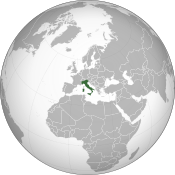Italy's PM Prodi faces confidence vote
Thursday, January 24, 2008
Image: Roosewelt Pinheiro, Agência Brasil.
Romano Prodi, the President of the Council of Ministers of Italy (commonly referred to as Prime Minister), is facing votes of confidence in both houses of the Parliament of Italy.
The Chamber of Deputies voted on Wednesday. The Senate will vote on Thursday. Prodi called for the votes himself on Tuesday in an effort to keep his weakened coalition in government.
The vote in the Chamber of Deputies was won by Prodi. In the lower house, Prodi supporters still command a clear majority, in the form of Prodi's L'Unione, which took power after the 2006 elections.
However, Thursday's vote in the Senate is expected to be very close. L'Unione has become destabilized due to the defection of UDEUR Populars, a somewhat small centrist party, but it can tip the balance of power. As a result, Prodi has come under pressure to resign before the vote. However, in 2007, Prodi survived a similar crisis, during which he pre-emptively resigned.
It is widely viewed that former-PM Silvio Berlusconi and his Casa delle Libertà, hope to force elections in Italy.
Berlusconi said that while he hopes for Prodi's resignation, he wants the government to remain until elections can be held: "I think that with the disappearance of the majority, the most logical thing would be that this government continues just for normal administration until the next elections, elections in the very near future."
Some allies of Prodi have suggested that he resign ahead of the Senate vote. This would be preferable to being forced to resign, if the Senate vote is lost.
Prodi met with Giorgio Napolitano, the President of the Italian Republic on Wednesday. Napolitano, as president, could accept a resignation, appoint a caretaker, and/or call elections.
Sources
- Stephen Brown. "Italian PM fights for survival in confidence votes" — Reuters, January 23, 2008
- Associated Press. "Italy’s Prodi under pressure to quit before vote" — MSNBC, January 23, 2008
- Ian Fisher. "Italy’s Premier Seeks to Bolster Support" — The New York Times, January 23, 2008

